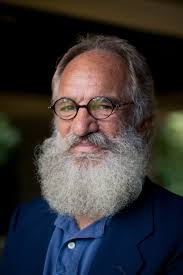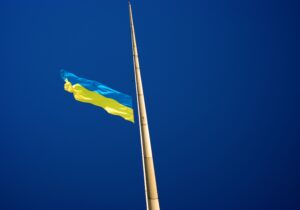The United States has a Duty to Defend in Ukraine
We have just entered the seventh month of the war in Ukraine. No one would have thought it possible that this former Soviet satellite state of just over 40 million people, whose “sovereignty” and “territorial integrity” were acknowledged in 1994, would have survived over a half-year of bombing and attempts at obliteration by Russian forces. Given Ukraine’s remarkably stubborn resistance to this unjust war – and it is wholly unjust by any and all moral measurements, thus demanding a response by nations who care about human dignity – we have perhaps forgotten the war’s global importance.
Where the war is being covered in news and analysis, there is no mention whatsoever of the 1994 accord that in fact “promised” Ukraine’s independence. I refer here to the Budapest Memorandum (BM), signed by four nations – Russia, Ukraine, Great Britain, and the United States. At the time, Ukraine was home to the world’s third largest nuclear arsenal; as part of the BM accord, Ukraine agreed to relinquish this arsenal in exchange for its independence.
Important questions confront us in the West – particularly Great Britain and the U.S. Was the BM a political or moral commitment on the part of Russia, Great Britain, and the U.S.? Or both? How, then, do we as signees to this accord honor those commitments?
Surely, in 2022 many Americans ask why the U.S. should be concerned about involvement in a nation 5,000 miles away in which we have no direct political or military interests. But the importance of this question is heightened by the fact that U.S. President Biden, addressing Indo-Pacific region leaders in late May, acknowledged that the U.S. would involve itself directly and militarily in Taiwan, were China intent on denying the island’s sovereignty by force. Indeed, we might press the logic of this matter as it concerns Ukraine, whose very sovereignty and territorial integrity the U.S. promised to protect. What has released us from this obligation?
Published comments by Sergei Karaganov, a former Kremlin advisor and current advisor to Putin, indicate that as early as 1997 war was predicted, should NATO expand and include Ukraine within its orbit. And indeed in 2014 Putin decided to annex Crimea and wage war through Russian proxy elements in eastern Ukraine. Moreover, Putin has made quite clear, in public comments both past and present, that Ukraine represents a war against the West. We in the West forget – or ignore – the fact of Putin’s public proclamations: were Ukraine to seek NATO membership, Ukraine would exist no more.
The need for a new and responsible foreign policy on the part of the U.S. cannot be overstated. For three decades the U.S. and Western nations have naively engaged in a policy of appeasement. We have ignored totalitarian tendencies in our foreign policy prescriptions, having assumed – as a result of the breakup of the Soviet empire – that conditions characterizing the Cold War had ended. Alas, we are faced with the undeniable fact that the Cold War never ended; it has only assumed new proportions. The totalitarian threat merely grew subversively while we slept. Nuclear deterrence, which was needed sixty years ago, is needed today, even when we have ignored its threat as expressed by multi-state terrorists, North Korea, China, and Iran. And, oh by the way, Russia under Putin’s totalitarian rule is the most recent reminder.
Almost three decades ago and roughly concurrent with the Rwandan bloodbath, celebrated political philosopher and just-war theorist Michael Walzer argued that the morality of non-intervention as an absolute policy needed to be called into question. While acknowledging that intervening in other nations should always generate anxiety and hesitation, he nevertheless questioned whether simply “ameliorating” the effects of unjust aggression – for example, providing medical supplies, food, and shelter – was a sufficient response. Where gross injustice such as attempts to annihilate or subjugate a people-group are occurring, Walzer argued, human decency requires that nations having the wherewithal to prevent egregious socio-political evil must attempt to “alter power relations on the ground.”
Just-war thinking, as developed over the centuries, wrestles with these responsibilities and raises the question of neighbor-love. What is our duty to those who suffer egregiously? Do those who have the wherewithal to prevent mass evil – extermination, gross human rights violations, and war crimes – really have the moral responsibility to inhibit and punish perpetrators of such horrendous evil? Surely, the lead-up to World War II, during which period relatively free nations responded with hesitation (if not powerlessness), taught us non-negotiable lessons.
If we consider German imperialist designs in the years of 1938-1940, the problem was appeasement. Austria was annexed, with Czechoslovakia following soon thereafter. Poland was conquered in 1939, with the low-lands – Holland, Belgium, and Luxembourg – being overrun in a matter of weeks. Then, France fell in 1940. Outside of Great Britain (wherein widespread attitudes of appeasement were to be found in contrast to Churchill’s desire to “set Europe ablaze” through internal resistance and a military response), no one could counter the totalitarian threat. But such is the nature of totalitarianism – in any age – and it demands a human reckoning. As I write these words, China is watching, and it is taking notes. We can expect, within the next five years, that the next international crisis will be Taiwan.
Ukrainian President Volodymyr Zelensky has described Russia as “the biggest terrorist organization in the world.” Given the massive number of war crimes committed since the beginning of the war, such a claim in no way exaggerates. Sadly, no international regulations are in place to monitor or prosecute such crimes, with the United Nations being wholly incompetent to address matters of international justice. Rogue regimes with nuclear capability have been uninhibited for decades; thus, we face foreign-policy decisions that run counter to our decades-long cherished assumptions. We will need to rethink – and be reinforced by – Cold War thinking that employed the threat of force to avert non-conventional and nuclear catastrophe.
President Biden’s fears of escalation, marking his diplomacy since the beginning of the war in Ukraine, have been characteristic of the West’s broader timidity (based on information from the Pentagon and U.S. Air Force intelligence, the recent consideration of our nation’s providing F-15 and F-16 jet fighters to Ukraine marks a considerable shift). Biden fears escalation; this plays into the hands of Putin, the former KGB operative, who exploits the West’s moral weakness with both cunning and barbarism.
In mid-May, the NATO’s Secretary-General Jens Stoltenberg, publicly praising Ukraine for its resilience, said that it was possible for Ukraine to win the war. Two months later, we may acknowledge that in truth this prognostication has less to do with Ukraine’s resolve than with the West’s resolve. Can the U.S. and NATO members give her what she desperately needs? Can we help her not merely to survive but to win a wholly unjust war which she did not choose but which portends future socio-political evil on a global scale?
Let us be clear: Putin has crossed the Rubicon. There is no turning back. His reign is dependent on whether he in fact validates his promises to undo the collapse of the Soviet empire. We need to acknowledge the truth: his war on Ukraine is a war against the West and all for which it stands, even in its present decadence and moral stupor.
Michael Walzer’s question of whether to intervene or not in another nation’s affairs is a perennial matter. Yes, we hesitate for good reasons. The U.S. cannot police the world, but neither can any other nation; such is a geographical and geopolitical impossibility. On the other hand, nations such as the U.S. have both the political and moral responsibility to encourage coalitions of nations – relatively free nations – to inhibit socio-political evil when and where it occurs, and to act themselves. In the end, we rescue those who need rescuing – regardless of how late in the game. Those living in relatively democratic societies should well understand this principle; it applies to our neighborhoods, to our cities, to our nation, and – yes, to the community of nations. We do this because of our fellow man. And when we need reminding of this responsibility, we need only think of recent history, in which hundreds of thousands – no, millions – died because no “neighbors” had the moral backbone to protect and to rescue. Again, Taiwan – and perhaps Moldova – will be next.
I began by noting that the U.S. was a signatory to the 1994 Budapest Memorandum, by which Ukraine’s “sovereignty” and “territorial integrity” were assured. Does the U.S. as one of four signatories have an abiding commitment to help a helpless nation – a nation whom we assured its “sovereignty” and “territorial integrity”?
Walzer observed that, in the end, it is unreasonable that human decency at home – i.e., in our own culture – can be expected if we do not display that decency to those in the international community who truly need it. Given our commitments to Ukraine in 1994, a response is (morally) required. Walzer’s argument needs reiterating: the responsibility of relatively free nations – especially, the U.S. – is not merely to wait until terrorist/tyrannical regimes have executed their vile work and then rush food and medicine to the ragged survivors. When and where that evil can be stopped, it must be stopped.
Otherwise, we really cannot call ourselves a decent people.







 Sponsor a student for Christianity & National Security 2024
Sponsor a student for Christianity & National Security 2024